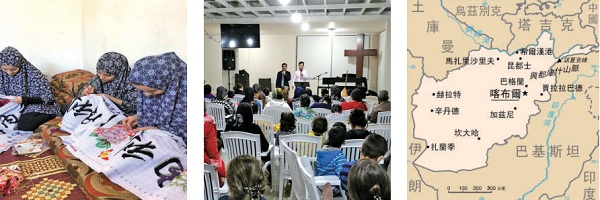Grace continues to spread
Afghan Refugee Ministry [Evacuation from Afghanistan] Special Report
Interviewee/International Galilee missionary J in Afghanistan
Interview/Liao Meihui

Please describe the current status of ministry in Afghanistan.
J:God called us to Afghanistan about four years ago and to Kabul, the capital, more than a year ago. The burden was to focus on cross-cultural minorities. In the past few years, the team in Afghanistan has consisted of three families, and they have contacted the local people through business missionary work. DMM’s teaching materials are also used as a bridge with Afghan Muslim friends.
Thank God, after three years, the first fruit was produced. He is a member of the Hazara ethnic group, who have Mongolian ancestry; they mainly live in central Afghanistan, northeastern Iran and northwest Pakistan (mainly in Quetta); they belong to Shiite Islam and are the third most populous ethnic group in Afghanistan, accounting for 9% of the entire population of Afghanistan.
At present, the team has withdrawn from Afghanistan, and through the connection of this Afghan brother, it is focusing on the ministry of Afghan refugees.
When will you withdraw from Afghanistan? Please briefly describe your current refugee ministry.
J:As frontline missionaries, we are honored to be able to enter among the Afghan people who are at the forefront, have the least resources, and have the greatest needs. After assessment, the emergency response team of the American Mission Headquarters issued a warning that they must leave Kabul and evacuate Afghanistan by the end of July.
The team is currently in Pakistan, and the refugee ministry is located in Quetta, Pakistan, which is also the base camp of the Hazara ethnic group.
According to BBC News, there are currently more than 3 million Afghan refugees in Iran; Pakistan has officially registered more than 1 million, but the actual number may be as high as 6 million; Afghan refugees are scattered in India, Europe and other places, and I believe there are still people who want to flee Afghanistan every day. From now to the next three years, the focus will be on the three major aspects of refugee resettlement, spiritual care and workplace training.
Please share your most impressive story while serving Afghan refugees.
J:19 refugee families received help, including food, phone cards, and money. They initially lived in the mosque, but because it was overcrowded, they were soon kicked out. They said: "We are desperate, and your help is like a miracle coming to us." They also said, "When someone lends a helping hand when we need it most, we will remember it for the rest of our lives."
After the Taliban takes power, people's lives, especially those of Christians, will enter a more difficult period. How will Afghanistan missions be affected? What hope does the Afghan refugee ministry see?
J:Indeed, it is difficult to evangelize in Afghanistan right now. Everyone knows that the Taliban regime is very unfavorable to Christians. Searching for Christians from house to house requires us to pray urgently for these members. Although it seems that missionary work is about to enter a dark period, as long as we hold on to our faith, we will not lose faith and hope. For the large number of refugees fleeing Afghanistan, the church can take the initiative to help them settle in, care for their needs, and build relationships. This is a good opportunity to sow the seeds of the gospel.
What is the biggest challenge right now? How can readers get involved?
J:Due to the large number of people, the challenges we face in serving are also very difficult. The team has arrived in Pakistan, but has not yet entered Quetta, where refugees are most concentrated. Through the Afghan brother mentioned above, the team decided to urgently arrange their own living expenses and transfer them to the refugees first.
I really can’t fully express the scene of refugees I saw. They climbed thousands of mountains and traveled thousands of miles, risking their lives to escape their hometowns just to reach a safe haven. They need the gospel because God is their ultimate refuge.
The biggest challenge at present is the lack of funds and manpower. Please pray that the service will be served to those who need it most. We sincerely call on more churches, institutions, and volunteers to participate in serving this wave of Afghan refugees, leading them to know God with practical actions and love, and achieving a new wave of revival.
postscript
In early September, the author happened to meet an old acquaintance, missionary B and his wife, at the Pennsylvania Messenger Association. Through B, I met Jim Brubaker, a retired missionary and former co-worker of the Messenger Association. In order to help P escape Afghanistan, Jim established an emergency prayer group with hundreds of people, wrote to the Pennsylvania Congressman, and monitored the progress every day.
Jim forwarded all his contacts with P, who was still trapped in Afghanistan at the time, to the author, including more than a dozen emails and dozens of text messages and voice records. After many twists and turns, the author finally got on the phone with P who was in a refugee camp in Texas on the eve of the 20th anniversary of the September 11th incident.
After B returned to the mission field, he learned that student H had successfully escaped from Afghanistan and his family arrived at the border with Pakistan.
Story 3 originally planned to interview Pastor Joseph Needham of American International Galilee. Unexpectedly, Pastor Li temporarily invited J, an Afghan refugee colleague, to join the interview and get a more comprehensive and immediate first-hand report.
American International Galilee

Galilee International US (GIU) was established in August 2018. Focus on supporting missionaries in their work on the front lines. Vision: Let the world know the Lord’s way, and all nations know the Lord’s salvation. Mission: We hope to cooperate with churches and evangelical missionary organizations to provide training, support and care for cross-cultural Chinese missionaries. Core values: Preaching the gospel to unreached people, workplace leadership, health service, diversity and unity, teamwork.
Afghanistan

(Map image source:https://commons.wikimedia.org/wiki/File:Afuhan-ditu-zh-tw.png)
Muslims make up 99.7% of Afghanistan's population. About 90% of Afghan Muslims are Sunni and about 9% are Shia. In addition to Muslims, there are also a small number of Sikhs and Hindus. Unconfirmed reports indicate that there are between 500 and 8,000 hidden Christians in Afghanistan. Afghanistan has a total population of approximately 37 million, of which millions of refugees live in neighboring countries and 3.5 million homeless people are stranded at the border. As of the end of September 2021, the United States and its allies have evacuated a total of more than 120,000 civilians.
This interview was completely unplanned in advance, and three stories fell from the sky. It can be said to be the most exciting, unforgettable and dramatic experience in the author's 20-year journalistic career.
To protect the interviewees and their families, the full names cannot be published. If you are willing to sponsor Brother P and the Afghan refugee ministry, please contact Wu Xinhui, executive editor of this magazine, or American International Galilee (https://www.gi-us.org/emergency).
 Liao Meihui, a special contributor to this publication. From Taiwan, certified Montessori teacher, Master of Christian Studies from Chinese Evangelical Theological Seminary in North America, winner of the first prize for in-depth reporting by independent media in New York. At the age of 26, he completed his "dream of studying abroad", at the age of 36, he realized his "dream of immigration", and at the age of 56, he was called by the Lord to enter the "dream of missionary work".
Liao Meihui, a special contributor to this publication. From Taiwan, certified Montessori teacher, Master of Christian Studies from Chinese Evangelical Theological Seminary in North America, winner of the first prize for in-depth reporting by independent media in New York. At the age of 26, he completed his "dream of studying abroad", at the age of 36, he realized his "dream of immigration", and at the age of 56, he was called by the Lord to enter the "dream of missionary work".
